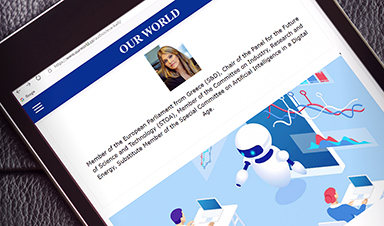In our transforming world, digital technology has the critical mass to push our frontiers and release unlimited potential. As the wave of digital transformation soars high, improving our lives, industries and economies, we must not overlook the risks that technologies and innovations pose on the fairness and cohesion of our societies, and our rights as European citizens.
Through the construction of vast digital infrastructures, which track, monitor and collect personal data at scale, major online platforms are commodifying our data. An entire ecosystem of apps and companies controls huge data flows and ‘treats’ technology users as data suppliers via the imposition of default choice architectures. The current form of ‘computational governance’ in which we are ruled by algorithms and predictive analytics which make use and trade of individual human experiences to produce predictions of human behaviour has largely remained unregulated. We can still be in control of safe AI, trustworthy and complimentary to humans.
AI is at the core of this wave of digitisation; the power it carries must be tamed before it is unleashed in its next form of super intelligence. Manifested in both software and hardware with intelligence expressed in lines of code and powerful automation, it is already being used to solve complex problems, discover patterns or predict traffic, and make suggestions to users. AI is also tested for completely autonomous vehicles, as deep machine learning could make decisions faster, safer and better than people. Progress remains incremental, however the more we advance our understanding and the further we develop this technology, the closer we reach the point where AI leaps from narrow to general, and then super intelligence. Narrow AI is already making simple suggestions and decisions at the service of people; however, the next level of AI sophistication can completely omit humans from the process and reach levels that humans will not be capable to understand or control anymore.
As most of human activity and industry has moved online during the pandemic, and we become more dependent on an increasing amount of digital services, a series of critical questions arise: How can we build data infrastructures that recognise the role of data as a public good? Can we foresee an impartial system of data governance that could reconcile the astonishing potential of these technologies with their significant human downsides? Do we as citizens know that when we use a search engine to find something online, the engine is learning by searching us as well? Does the collection and processing of behavioural data by these technology platforms threaten to dismantle democracy and undermine the rule of law?
To tackle these questions we need to come up with novel, innovative responses, so that we make our future better than the grim outlook predicted in Black Mirror, the popular Netflix series. We have to be aware and cautious in designing the appropriate framework for AI; intelligent systems are used on the pandemic front for rapid COVID diagnosis and prognosis based on AI-enabled CT scanning analysis. AI systems are used now to upgrade our mapping systems, the management of resources, to make our mobility smarter, our agriculture more precise, with predictive maintenance and smart sensors that can contribute to a greener future, saving time, energy, and resources.
As the impact of exponential technologies grows, a new framework is needed in Europe to harness its benefits and mitigate its risks. This framework must be built on ethical principles and binding standards, which elevate people’s trust in AI and ensure that in the digital age, people co-exist with intelligent systems without fearing exclusion, manipulation, oppression or discrimination. Retaining freedom of choice in a human-centric AI that would prevent brain computer interfaces challenging the nature and future of humanity. In contrast to the trends of the Fourth Industrial Revolution towards inequalities and dehumanization, technology and innovation best practices need now to be bent back towards the service of humanity, and Europe could lead as a global rules and standards setter for the Fifth Industrial Revolution….
 By Eva Kaili – Member of the European Parliament from Greece (S&D), Chair of the Panel for the Future of Science and Technology (STOA), Member of the Committee on Industry, Research and Energy, Substitute Member of the Special Committee on Artificial Intelligence in a Digital Age.
By Eva Kaili – Member of the European Parliament from Greece (S&D), Chair of the Panel for the Future of Science and Technology (STOA), Member of the Committee on Industry, Research and Energy, Substitute Member of the Special Committee on Artificial Intelligence in a Digital Age.
News
Scientists discover natural ‘brake’ that could stop harmful inflammation
Researchers at University College London (UCL) have uncovered a key mechanism that helps the body switch off inflammation—a breakthrough that could lead to new treatments for chronic diseases affecting millions worldwide. Inflammation is the [...]
A Forgotten Molecule Could Revive Failing Antifungal Drugs and Save Millions of Lives
Scientists have uncovered a way to make existing antifungal drugs work again against deadly, drug-resistant fungi. Fungal infections claim millions of lives worldwide each year, and current medical treatments are failing to keep pace. [...]
Scientists Trap Thyme’s Healing Power in Tiny Capsules
A new micro-encapsulation breakthrough could turn thyme’s powerful health benefits into safer, smarter nanodoses. Thyme extract is often praised for its wide range of health benefits, giving it a reputation as a natural medicinal [...]
Scientists Develop Spray-On Powder That Instantly Seals Life-Threatening Wounds
KAIST scientists have created a fast-acting, stable powder hemostat that stops bleeding in one second and could significantly improve survival in combat and emergency medicine. Severe blood loss remains the primary cause of death from [...]
Oceans Are Struggling To Absorb Carbon As Microplastics Flood Their Waters
New research points to an unexpected way plastic pollution may be influencing Earth’s climate system. A recent study suggests that microscopic plastic pollution is reducing the ocean’s capacity to take in carbon dioxide, a [...]
Molecular Manufacturing: The Future of Nanomedicine – New book from Frank Boehm
This book explores the revolutionary potential of atomically precise manufacturing technologies to transform global healthcare, as well as practically every other sector across society. This forward-thinking volume examines how envisaged Factory@Home systems might enable the cost-effective [...]
New Book! NanoMedical Brain/Cloud Interface – Explorations and Implications
New book from Frank Boehm, NanoappsMedical Inc Founder: This book explores the future hypothetical possibility that the cerebral cortex of the human brain might be seamlessly, safely, and securely connected with the Cloud via [...]
Global Health Care Equivalency in the Age of Nanotechnology, Nanomedicine and Artificial Intelligence
A new book by Frank Boehm, NanoappsMedical Inc. Founder. This groundbreaking volume explores the vision of a Global Health Care Equivalency (GHCE) system powered by artificial intelligence and quantum computing technologies, operating on secure [...]
Miller School Researchers Pioneer Nanovanilloid-Based Brain Cooling for Traumatic Injury
A multidisciplinary team at the University of Miami Miller School of Medicine has developed a breakthrough nanodrug platform that may prove beneficial for rapid, targeted therapeutic hypothermia after traumatic brain injury (TBI). Their work, published in ACS [...]
COVID-19 still claims more than 100,000 US lives each year
Centers for Disease Control and Prevention researchers report national estimates of 43.6 million COVID-19-associated illnesses and 101,300 deaths in the US during October 2022 to September 2023, plus 33.0 million illnesses and 100,800 deaths [...]
Nanomedicine in 2026: Experts Predict the Year Ahead
Progress in nanomedicine is almost as fast as the science is small. Over the last year, we've seen an abundance of headlines covering medical R&D at the nanoscale: polymer-coated nanoparticles targeting ovarian cancer, Albumin recruiting nanoparticles for [...]
Lipid nanoparticles could unlock access for millions of autoimmune patients
Capstan Therapeutics scientists demonstrate that lipid nanoparticles can engineer CAR T cells within the body without laboratory cell manufacturing and ex vivo expansion. The method using targeted lipid nanoparticles (tLNPs) is designed to deliver [...]
The Brain’s Strange Way of Computing Could Explain Consciousness
Consciousness may emerge not from code, but from the way living brains physically compute. Discussions about consciousness often stall between two deeply rooted viewpoints. One is computational functionalism, which holds that cognition can be [...]
First breathing ‘lung-on-chip’ developed using genetically identical cells
Researchers at the Francis Crick Institute and AlveoliX have developed the first human lung-on-chip model using stem cells taken from only one person. These chips simulate breathing motions and lung disease in an individual, [...]
Cell Membranes May Act Like Tiny Power Generators
Living cells may generate electricity through the natural motion of their membranes. These fast electrical signals could play a role in how cells communicate and sense their surroundings. Scientists have proposed a new theoretical [...]
This Viral RNA Structure Could Lead to a Universal Antiviral Drug
Researchers identify a shared RNA-protein interaction that could lead to broad-spectrum antiviral treatments for enteroviruses. A new study from the University of Maryland, Baltimore County (UMBC), published in Nature Communications, explains how enteroviruses begin reproducing [...]





















